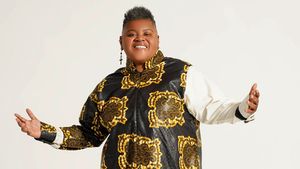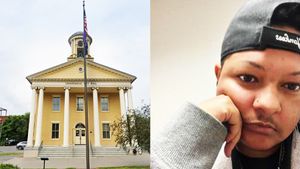In 1960, John Rechy received an invitation to spend the summer on the private island of a wealthy admirer of his writing. Rechy had published just two short stories at that point in his career, both of which borrowed heavily from his experiences as a male hustler. He was desperately longing for a break from a life of prostitution in Los Angeles, so he accepted the stranger's invitation. What happened on that island is the subject of Rechy's shocking, erotic, and suspenseful new novel, After the Blue Hour.
More than half a century after that memorable summer, Rechy welcomes me into his home in the Hollywood Hills. The house is a tasteful two-story equipped with elegant modernist furniture, classic portraits of cinematic starlets, and a spiral art deco staircase. The backyard is the triumph of the property, with its sweeping views of Los Angeles.
"The Hollywood sign is right over there," Rechy says, ushering me onto the lawn. "And that's Griffith Park." Best known for City of Night, his landmark 1963 novel based on his time as a hustler traveling across the United States, Rechy had a very different view of that park during his youth, when he went there to seek out potential clients. City of Night sparked endless controversy, became a best seller, and established Rechy as a pioneer of modern queer literature. He has published 17 books since and has received several awards, including the PEN Center USA's Lifetime Achievement Award.
 Now 85 years old, Rechy is tough, passionate, and sharp as ever -- though his hustling days are long over. "I was 55 the last time I hustled, and I gave the man his money back," Rechy recalls with a booming laugh. "I did! It was like putting a period on things. I felt good. It was over."
Now 85 years old, Rechy is tough, passionate, and sharp as ever -- though his hustling days are long over. "I was 55 the last time I hustled, and I gave the man his money back," Rechy recalls with a booming laugh. "I did! It was like putting a period on things. I felt good. It was over."
After a brief tour of his home, we settle in front of a fire to discuss what is perhaps his most autobiographical novel to date. After the Blue Hour (tantalizingly subtitled A True Fiction on its cover page) follows a fictional character named John Rechy as he joins his host Paul on a private island. Like the protagonist, Paul considers himself somewhat of a hustler himself, though he works in a considerably higher income bracket than the 24-year-old John. He has been married and divorced twice, to two wealthy and notable women who have left him with a considerable fortune, an impressive collection of art, and the luxurious island. That summer, John shares his space with Sonya, a stunning model and Paul's current lover, as well as Paul's troubled son, Stanty. He is initially unsure of his host's motivations for inviting him, but as the summer progresses Paul draws John into a dangerous psychosexual game. Tans darken and tensions mount as the novel careens toward a twisted, violent finish.
As "true fiction," the book has a meta quality to it; the narrator states that fiction is "more honest in its disguise" than autobiography. This sentiment is shared by Rechy, who claims that this novel mirrors his life more than his own memoir, 2008's About My Life and the Kept Woman. "[In After the Blue Hour] the John Rechy character is confronting himself," Rechy says. "And yes, as an author I am also confronting myself." Though events have been embellished and altered, he insists After the Blue Hour captures an essential verity more that's truer than the manipulated truth of autobiography.
Says Rechy, "When you present a memoir, you're saying, 'This is true, I remember.' Bullshit. Memory has its own narrative. And what we bring forth [in autobiography] is memory's narrative, not life narrative."
Rechy was born in 1931 in El Paso, Texas, and even as a child he was fascinated by the intersection of real life and fiction. Rechy always wanted to be a writer, and his first attempt at a novel was a fictionalization of the life of Marie Antoinette ("I had about 100 pages by age 11," he says with a wry grin). But as Rechy grew up in Depression-era Texas, his sympathies shifted away from the indulgent queen to other creative endeavors. By the age of 18, he'd completed his first novel, Pablo!, a fantastical work based on Mayan legends. (It has sat unpublished for years, but Rechy says it will officially be released later this year.)
 The writer earned his B.A. in English from the University of Texas at El Paso, then called Texas Western College, around 1951. (Dates are a bit fuzzy for Rechy: "I'm not trying to disguise my age at all -- it's just the unreliability of memory," he says.) As he finished school, the draft for the Korean War loomed large, and Rechy voluntarily joined the Army "to get it over with." After two years of service, he left to enroll as a grad student at Columbia University in 1953. There, he submitted his unpublished manuscript of Pablo! as part of his application to a creative writing class taught by Nobel Prize winner Pearl S. Buck.
The writer earned his B.A. in English from the University of Texas at El Paso, then called Texas Western College, around 1951. (Dates are a bit fuzzy for Rechy: "I'm not trying to disguise my age at all -- it's just the unreliability of memory," he says.) As he finished school, the draft for the Korean War loomed large, and Rechy voluntarily joined the Army "to get it over with." After two years of service, he left to enroll as a grad student at Columbia University in 1953. There, he submitted his unpublished manuscript of Pablo! as part of his application to a creative writing class taught by Nobel Prize winner Pearl S. Buck.
"She wouldn't take me for her writing course," Rechy says, punctuating his recollection with a middle-fingered salute. "So instead of studying with Ms. Pearl Buck, whom I didn't like, I found Times Square." It was there that he began hustling. "While I was having those experiences, I did not once think I was going to write about it," he says.
By the late 1950s, Rechy had grown tired of the Times Square scene, so he traveled the country hustling, while still nursing writerly ambitions. He hit a low point during a hellish Mardi Gras celebration in New Orleans. An excess of booze, drugs, and sex marred his time in the city, and he feared he'd drifted too far into the darkness of his chosen path. The trip marked the nadir of his life -- the only time his self-confidence failed him. "I thought I was as trapped as the other [hustlers]," Rechy says. "I thought, This is it. My fate will be like the others, and it's all gone. But that was my salvation in a sense."
Rechy lifted himself out of the world of prostitution by writing about it, articulating his feelings of despair in a letter to a friend. Once it was finished, Rechy realized the letter sounded like a story, and he submitted a draft of it to literary journals. Evergreen Review -- which had published Beckett, Genet, and Camus -- accepted the piece and published it under the title "Mardi Gras" in 1958. An editor at the magazine asked if the story was part of a novel. It was not, but Rechy lied and said it was. And with that, Rechy began writing the book that would become City of Night.
 City of Night was released in 1963 and became an international best seller. At the time, few had documented a queer existence with such detail and candor. Many described Rechy's writing as the American answer to the lyricism and sexual frankness of Jean Genet. But the novel was also contentious, shunned by a public that regarded homosexuality as obscene and a literary establishment unwilling to let a hustler into their ranks. Many critics judged not the novel itself but the life on which it was based (a petty assessment in The New York Review of Books titled "Fruit Salad" was particularly unfair). But City of Night has stood the test of time, defying the prejudice of its early detractors to become a modern classic. It was a watershed moment in literary history, bringing the queers of the underground into the light.
City of Night was released in 1963 and became an international best seller. At the time, few had documented a queer existence with such detail and candor. Many described Rechy's writing as the American answer to the lyricism and sexual frankness of Jean Genet. But the novel was also contentious, shunned by a public that regarded homosexuality as obscene and a literary establishment unwilling to let a hustler into their ranks. Many critics judged not the novel itself but the life on which it was based (a petty assessment in The New York Review of Books titled "Fruit Salad" was particularly unfair). But City of Night has stood the test of time, defying the prejudice of its early detractors to become a modern classic. It was a watershed moment in literary history, bringing the queers of the underground into the light.
Rechy went on to publish multiple best sellers, and he taught at institutions such as Occidental College, UCLA, and USC. But even after achieving literary success, the writer did not give up hustling. For Rechy, prostitution was never about the money; it was about the power of being desired. He explored both power and desire in depth when he fictionalized his hustling experiences. In this way, fiction and real life were crucially intertwined for him. But sometimes this double life would create comical misunderstandings.
"During the time I taught at UCLA, I remember standing on the corner hustling at 3 o'clock in the morning," Rechy recalls. "A car drove by, and a young kid rolled down the window and said, 'Good evening, Professor Rechy. Are you out for an evening stroll?' " He laughs.
Rechy kept hustling well into his relationship with film producer Michael Ewing, his longtime "mate." (This is Rechy's preferred non-heteronormative term for his beloved: "I don't like the word 'spouse,' and I detest 'husband.' ") Rechy met Ewing while hustling in 1980s Los Angeles. At first he didn't reveal his identity to him, thinking his new boyfriend liked his "street" persona. But eventually the charade became too difficult to sustain -- "the pose shattered" -- and Rechy revealed that he was, in fact, the author of the books City of Night, The Sexual Outlaw, and Numbers. They fell in love, and eventually Rechy was forced to make a difficult decision.
"I didn't want to let go of my street life," Rechy says. "But one night I was on Santa Monica Boulevard, and as I was getting in a man's car I looked out the window and saw Michael coming toward me. He'd seen me. I said to the man, 'Please let me out.' And then I went after Michael, and he was crying. Everything changed then. I stopped seeing anyone else. We've been with each other for more than 30 years."
But while Rechy's personal life has settled into a somewhat conventional domesticity, his fiction is as provocative and electric as ever. Rechy has explored the intersection of identity, sexual yearning, and morality throughout his career, but never with the clarity he exhibits in After the Blue Hour. "Now this may sound like writer bullshit," Rechy says with a self-deprecating cackle, "but on many levels I think this is my best book. I controlled all that had been so pulsing and romantic in City of Night. And now it's not romantic. [After the Blue Hour] is a tough book."
If City of Night was applauded for its youthful, carnal immediacy, After the Blue Hour succeeds because it offers perspective that only age can supply. The novel's title comes from the narrator's description of "the blue hour" -- those "few seconds of blue light between dusk and night [when] everything reveals itself as it is." Rechy delivers on the promise of that title, mining his own experience for essential human truths. And though many staggering secrets are exposed by the novel's brutal conclusion, the most powerful revelation is a very intimate one: It's John Rechy revealing himself.
Photography: Roger Davies
Like what you see here? Subscribe and be the first to receive the latest issue of Out. Subscribe to print here and receive a complimentary digital subscription.
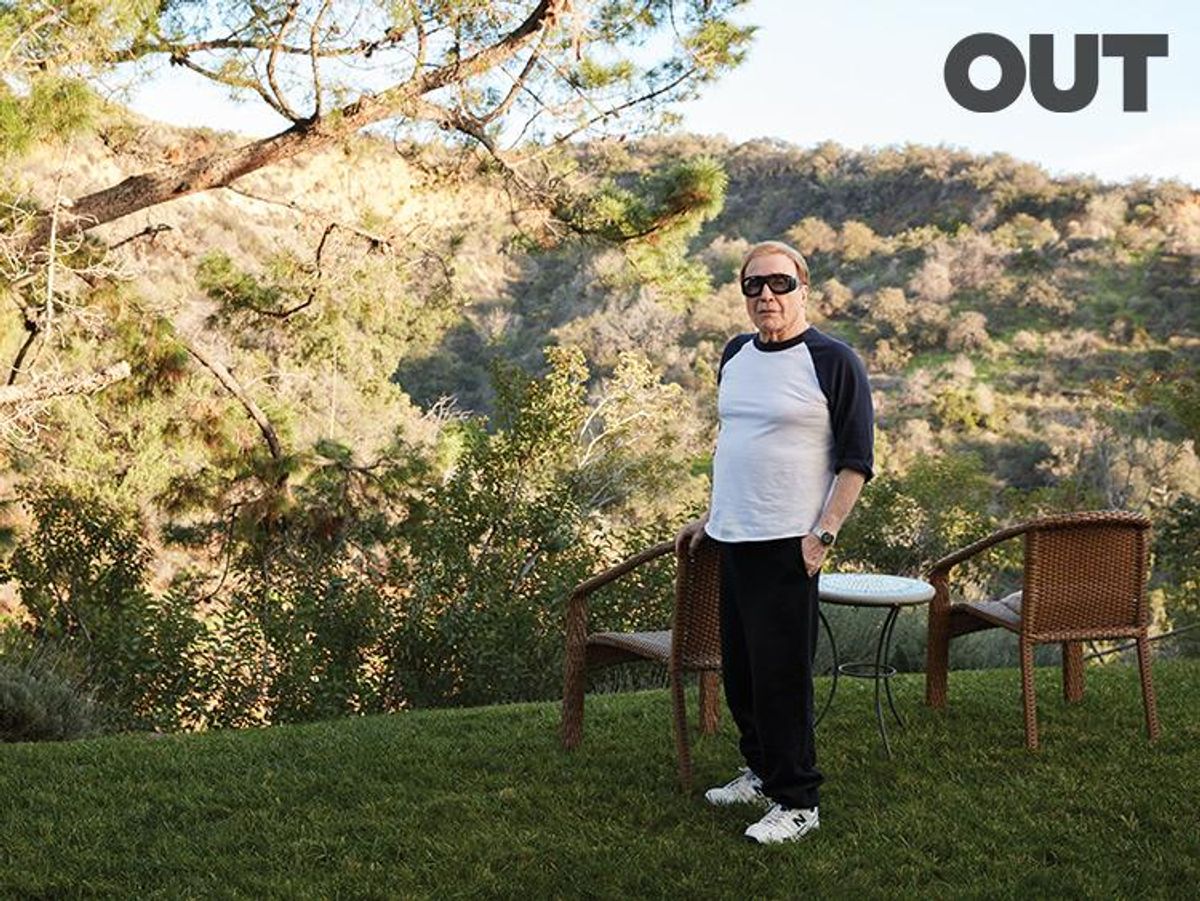





















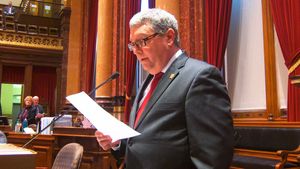








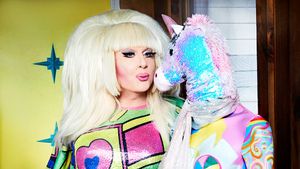


 Now 85 years old, Rechy is tough, passionate, and sharp as ever -- though his hustling days are long over. "I was 55 the last time I hustled, and I gave the man his money back," Rechy recalls with a booming laugh. "I did! It was like putting a period on things. I felt good. It was over."
Now 85 years old, Rechy is tough, passionate, and sharp as ever -- though his hustling days are long over. "I was 55 the last time I hustled, and I gave the man his money back," Rechy recalls with a booming laugh. "I did! It was like putting a period on things. I felt good. It was over."  The writer earned his B.A. in English from the University of Texas at El Paso, then called Texas Western College, around 1951. (Dates are a bit fuzzy for Rechy: "I'm not trying to disguise my age at all -- it's just the unreliability of memory," he says.) As he finished school, the draft for the Korean War loomed large, and Rechy voluntarily joined the Army "to get it over with." After two years of service, he left to enroll as a grad student at Columbia University in 1953. There, he submitted his unpublished manuscript of Pablo! as part of his application to a creative writing class taught by Nobel Prize winner Pearl S. Buck.
The writer earned his B.A. in English from the University of Texas at El Paso, then called Texas Western College, around 1951. (Dates are a bit fuzzy for Rechy: "I'm not trying to disguise my age at all -- it's just the unreliability of memory," he says.) As he finished school, the draft for the Korean War loomed large, and Rechy voluntarily joined the Army "to get it over with." After two years of service, he left to enroll as a grad student at Columbia University in 1953. There, he submitted his unpublished manuscript of Pablo! as part of his application to a creative writing class taught by Nobel Prize winner Pearl S. Buck. City of Night was released in 1963 and became an international best seller. At the time, few had documented a queer existence with such detail and candor. Many described Rechy's writing as the American answer to the lyricism and sexual frankness of Jean Genet. But the novel was also contentious, shunned by a public that regarded homosexuality as obscene and a literary establishment unwilling to let a hustler into their ranks. Many critics judged not the novel itself but the life on which it was based (a petty assessment in The New York Review of Books titled "Fruit Salad" was particularly unfair). But City of Night has stood the test of time, defying the prejudice of its early detractors to become a modern classic. It was a watershed moment in literary history, bringing the queers of the underground into the light.
City of Night was released in 1963 and became an international best seller. At the time, few had documented a queer existence with such detail and candor. Many described Rechy's writing as the American answer to the lyricism and sexual frankness of Jean Genet. But the novel was also contentious, shunned by a public that regarded homosexuality as obscene and a literary establishment unwilling to let a hustler into their ranks. Many critics judged not the novel itself but the life on which it was based (a petty assessment in The New York Review of Books titled "Fruit Salad" was particularly unfair). But City of Night has stood the test of time, defying the prejudice of its early detractors to become a modern classic. It was a watershed moment in literary history, bringing the queers of the underground into the light.







